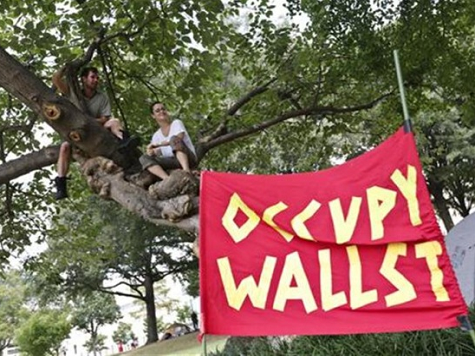
Measured by any number of metrics, the Occupy Wall Street movement has been a dismal failure. After blowing through hundreds of thousands of dollars and losing their encampments nationwide, they have been living in exile for most of 2012, and none of their big announced “days of protest” met with success. Don’t fret, though; that hasn’t kept leftist memes from having a banner year. As 2013 nears, the Occupy Wall Street movement lives on stronger than ever due to its symbiotic relationship with supportive mainstream media and President Obama’s community organizing agenda.
How is it possible that Occupy is both a success and a failure at the same time? That’s because the goal isn’t really about achieving some practical, specific set of results. As has been pointed out countless times, the Occupy Wall Street movement never laid out exactly what it is that they wanted, so measuring results is impossible. This is one way that movement owes much to the Saul Alinsky school of community organizing, which is not so much about fixed ends but instead is predicated on aiming to “turn scattered, voiceless discontent into a united protest”. The goal is to create discontent, not to provide the solution.
And so it was that Occupy Wall Street followed Alinsky’s rules six (“A good tactic is one your people enjoy.”), seven (“A tactic that drags on too long becomes a drag.”), and eight (“Keep the pressure on. Never let up.”) in 2012. Freed of the camping out tactic that had clearly dragged on too long, Occupy kept the pressure on with tactics their people enjoyed, such as Black Bloc style rioting and property damage. There were skirmishes at May Day celebrations, at anti-austerity protests, and at both political party’s political conventions. These were minor ways of keeping the troops engaged, active and in the news, but it wasn’t Occupy’s only activity throughout the year.
The thing that got Occupy the most positive press was their Occupy Sandy effort, which gave the press a chance to rebrand the movement as a sort of hipster Red Cross, while somehow still pretending the Obama administration had handled Sandy with deft professionalism. The press threw praise at Occupy out of all proportion to comparative work done by religious groups such as the Church of Latter Day Saints.
Occupy also got kudos in the press for The Rolling Jubilee, their well publicized scheme to pay off other people’s debt by raising money through voluntary donations and events like a ‘telethon’ feauring Janeane Garofalo.
CNN Money ran an article titled Occupy Wall Street’s Rolling Jubilee: Your questions answered that begins by asking “Will Occupy Wall Street’s debt buying plan work? Yes.”
However, anyone who actually bothers to read the CNN article will learn that the real answer is No, it doesn’t work; but like the entire Occupy Wall Street movement, it working or not doesn’t matter. As the article says:
In some key ways, the project doesn’t really ‘work.’ But that, of course, is missing the point. Organizers say the actual goal is to jumpstart the conversation about debt that originated from predatory lending practices. ‘I want to make it really clear that what we’re doing here is not charity,’ Smith said. ‘It’s not debt forgiveness. It’s a political statement about what we view to be odious debts.’
Not only doesn’t Rolling Jubilee “work”, but it could actually make things worse for the people receiving the money. The blog Naked Capitalism – which sports a big “I Support The Occupy Movement” banner – did an exhaustive look at the problems potentially created by the Rolling Jubilee for recipients and found that, aside from unforeseen tax consequences, it could end up actually making their credit reports worse. Naked Capitalism says that, while Rolling Jubilee “sounds like a clever way to help debt overburdened consumers, upon inspection it looks more like a gimmick,” and they conclude:
What is most distressing is that (Occupy Wall Street) seems unconcerned about the idea that they could wind up hurting the people they profess they want to help to make a political point, and that they’ve put them at risk without getting their consent.
But the ends justify the means for the Left, so what does it matter if the the program actually hurts the people it claimed to be trying to help, if it yields good publicity for Occupy Wall Street ?

COMMENTS
Please let us know if you're having issues with commenting.